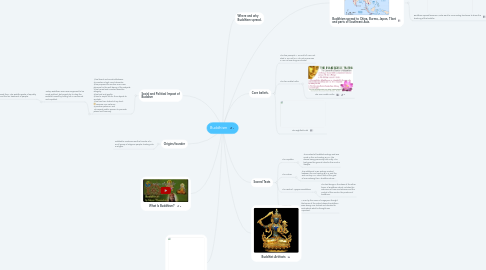
1. Social and Political Impact of Buddism
1.1. 1) be liberal and avoid selfishness, 2) maintain a high moral character, 3) be prepared to sacrifice one's own pleasure for the well-being of the subjects, 4) be honest and maintain absolute integrity, 5) be kind and gentle, 6) lead a simple life for the subjects to emulate, 7) be free from hatred of any kind, 8) exercise non-violence, 9) practise patience, and 10) respect public opinion to promote peace and harmony.
1.1.1. Today: Buddhism was never supposed to be made political, but people try to drag the Buddha himself by calling him a communist and capitalist.
1.1.1.1. Back then: The Buddha spoke of equality and the fair treatment of people.
2. Origins/founder
2.1. Siddhartha Gautama was the founder of a small group of religious people, leading into a religion.
3. What Is Buddhism?
4. Buddhist Art
5. Buddhism spread to China, Burma, Japan, Tibet and parts of Southeast Asia.
5.1. Buddhism spread because Monks went to surrounding territories to share the teaching of the buddha.
6. Core beliefs.
6.1. The five precepts 1. Do not kill 2.Do not steal 3. Do not lie 4. do not misuse sex 5. Do not use drugs or alcohol
6.2. The four noble truths
6.2.1. The Four Noble Truths
6.3. The Eightfold Path
7. Where and why Buddhism spread.
8. Sacred Texts
8.1. The Tripitaka
8.1.1. The earliest of buddhist writings and was made in the 3rd century B.C.E., the stories being previously told orally. The text gives the ground rules for the monk's lifestyle.
8.2. The Sutras
8.2.1. The additional 2184 writings created between the 2nd century B.C.E. and the 2nd century C.E., which tells of the goal of one realizing their "buddha-nature".
8.3. The Texts of Vajrayana Buddhism
8.3.1. The text brings in the ideas of the other forms of Buddhism which includes the relevance of how one behaves and the control of the mind in the practice of buddhism.
8.4. Nagarjuna
8.4.1. A man by the name of Nagarjuna thought that some of the critical ideas of Buddhism were being over looked and decided to write about what he thought was important.

